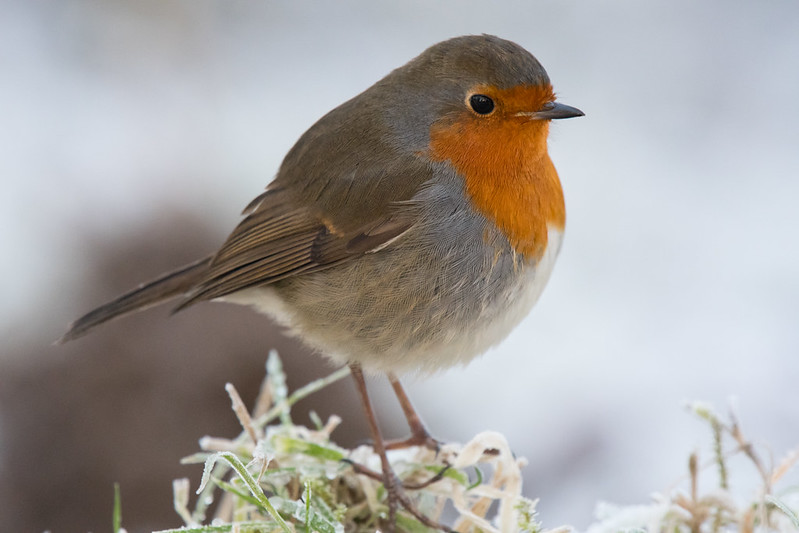
It’s easy to see why the Robin is our favourite bird. They are common, occur in towns and gardens as well as the countryside, are confiding to the point of appearing friendly, easy to identify, have a nice orange patch on their breast and have beautiful dark eyes. Haven’t you ever looked deep into a Robin’s eyes? I have. You should.
I was sitting in the garden the other day as a Robin approached quite closely – our eyes met. Well, actually I, with my forward-facing eyes at the front of my head looked at the Robin and he or she, with their looking-everywhere-at-once eyes on the side of their head might have been looking at an insect, but probably saw me. Robin’s eyes are like deep pools and one could get lost in those eyes.
But they are not much to do with song.
Robins may, in fact do, have lovely eyes but they are vicious little b*ggers – always up for a fight with another Robin. They are, perhaps, a very British bird. Robins are a bit unusual in that in winter males and females each set up territories in which they feed and these territories break down in spring and pairs form more conventional territories. Robins sing through the winter to defend their territories and therefore males and fermales sing then, a slightly different song from the spring, breeding season, song which is, as far as I know, just sung by males.
Here’s a Robin singing near Eindhoven a couple of weeks ago, sounds just like the ones around my garden to me (even down to the calling Jackdaws in the garden);
Here’s one from Austria – sounds a little simpler in form, and less melodic to me, but it’s definitely Robin-ish;
And here’s a Robin from Yorkshire;
Whereas Song Thrushes and Great Tits belt out their songs, Robins and Blackbirds sing theirs with a degree of tenderness. And Robins always sound plaintive to me. This song is still, presumably, saying ‘keep out’ to other males and ‘come and get me’ to females, but it is the opposite of strident.
It’s the song of a bird with lovely eyes.
[registration_form]
Lovely eyes and very big eyes for the size of the bird. Which is why it’s almost always the last garden bird active as the light fades in the evening.
And by the same token, one of the first garden birds to sing or call in response to increasing dawn light.
Indeed chaps but it has big eyes because it is crepuscular feeding and active in the half light rather than the other way round. Lovely word crepuscular, I have a friend who always says crespucular instead much to the merriment of any colleagues in earshot. Back to Robins, has anyone else noticed there is one short phrase in a distant Robin song that for just a millisecond makes you think Blackcap?
The first bird I handled as a child was a Robin beaten to a pulp by a fellow Robin, needless to say it died.
That’s an interesting thought. But if their big eyes evolved gradually though incremental changes then I’m not sure it’s possible to say which way around it is!
Agreed Ian thinking about it if it was incremental you are right. Actually the Robin comes from a whole family of good songsters with big eyes because they are either crepuscular or prefer to live in dense shade.